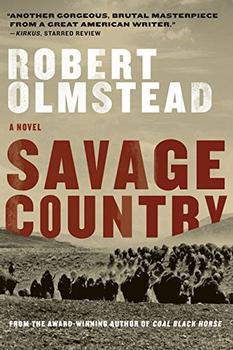Summary | Excerpt | Reviews | Beyond the Book | Readalikes | Genres & Themes | Author Bio

A Novel
by Robert OlmsteadFrom
Savage Country
By Robert Olmstead
Some distance from town he was met with the smell of raw sewage and creosote, the stink of lye and kerosene oil, the carrion of dead and slaughtered animals unfit for human consumption. He struck the mapped, vacant streets where there was a world of abandoned construction, plank shacks with dirt floors and flat-pitched roofs hedged with brambles and waste. Two cur dogs snarled at each other over a bone. Dead locust strewed the ground three inches deep.
The year was 1873 and all about was the evidence of boom and bust, shattered dreams, foolish ambition, depredation, shame, greed, and cruelty. Notes were being called in for pennies on the dollar. Money was scarce and whole families were pauperized.
For weeks countless swarms of locusts, brown-black and brick-yellow, darkened the air like ash from a great conflagration, their jaws biting all things for what could be eaten. They fed on the wheat and corn, the lint of seasoned fence planks, dry leaves, paper, cotton, the wool on the backs of sheep. Their crushed bodies slicked the rails and stopped the trains.
Michael rode light in the saddle, his left hand steady on the reins. His trousers were tucked inside the shafts of his stovepipe boots, and the buckhorn haft of a long knife protruding above the top was decorated with plates of silver. His black hair was long and plaited into a queue, which hung down his back. A shotgun was cradled in his free arm and on the saddle before him sat a setter dog and behind his right leg hung a string of game birds. The red dog had fallen out a mile ago and he thought that was perhaps for the best.
Farther on was a ravine of tents and dugouts where gambling, drinking, dog fights, and cockfights were taking place. Dingy flaps of canvas were flung back and barefoot women swept their dirt floors into the road. From a tent advertising Turkish baths came the bleating sound of a hurdy-gurdy. Men lay sleeping on the ground undisturbed, a paste of dirt and saliva on their bruised faces.
Ahead was the darker line marking the railroad grade and the looming warehouses lining the tracks, the bone pickers and hair scavengers converging and departing from across the open land. Along the right-of-way was a rick of bones twelve feet high, segmented in the shape of boxcars, and a half mile long. This was the last of the Kansas buffalo.
Soon he could hear the hammering and banging of the blacksmith. There was a fine dust in the air that remained suspended. An eastbound train chuffed to a stop to take on bones, water, and the broke families bankrupted by the plague of locust.
A portly man in fawn-colored trousers and a black overcoat came off the platform in a hurry. He stepped into a two-horse fringed-top surrey parked at one end. The man reached for the whip and gave the team a smart cut across the flanks. The drays stepped out and in tandem, their broken tails lifting in cadence.
At the post office Michael asked after mail for himself or anyone at Meadowlark. There was a letter for him from Mr. Salt.
"Michael Coughlin," the postmaster read, handing him the envelope.
"This letter has been opened," he said.
"It must not have been adequately sealed," the postmaster said.
He handed the postmaster the sealed envelope he carried. He paid the postage to London and inquired when the mail would be sent. The stamp affixed, he took back the envelope.
"I will be happy to take care of that for you," the postmaster said, his hand out.
"You can take care of this one," he said, handing him another.
"You can do that?" he said.
"Yessir," the postmaster said.
There was a plaza in town and a collection of shops on the four sides of it: saddler, watchmaker, gunsmith, mercantile, hotel, barroom, two druggists. Michael stopped at each one, explaining that his brother, David Coughlin, had passed and Michael would settle outstanding balances. From the druggists he purchased their supply of quinine and asked that they order more and make delivery to Meadowlark. The first had nothing to say, but the second one did.
Excerpted from Savage Country by Robert Olmstead. Copyright © 2017 by Robert Olmstead. Excerpted by permission of Algonquin Books. All rights reserved. No part of this excerpt may be reproduced or reprinted without permission in writing from the publisher.
Harvard is the storehouse of knowledge because the freshmen bring so much in and the graduates take so little out.
Click Here to find out who said this, as well as discovering other famous literary quotes!
Your guide toexceptional books
BookBrowse seeks out and recommends the best in contemporary fiction and nonfiction—books that not only engage and entertain but also deepen our understanding of ourselves and the world around us.